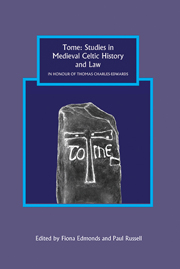Book contents
- Frontmatter
- Contents
- List of Illustrations
- Preface
- List of Contributors
- Abbreviations
- 1 Cloud-Cuckoo Land? Some Christian Symbols from Post-Roman Britain
- 2 Columbanus's Monasticism and the Sources of his Inspiration: From Basil to the Master?
- 3 Early Irish Priests within their Own Localities
- 4 Political Organisation in Dál Riata
- 5 Irish Boundary Ferta, their Physical Manifestation and Historical Context
- 6 Asser's Parochia of Exeter
- 7 Viking-Age Sculpture in North-West Wales: Wealth, Power, Patronage and the Christian Landscape
- 8 Iona v. Kells: Succession, Jurisdiction and Politics in the Columban Familia in the Later Tenth Century
- 9 A Twelfth-Century Indulgence Granted by an Irish Bishop at Bath Priory
- 10 Gerald of Wales, Gildas, and the Descriptio Kambriae
- 11 Patrick's Reasons for Leaving Britain
- 12 Learning Law in Medieval Ireland
- 13 Holding Court: Judicial Presidency in Brittany, Wales and Northern Iberia in the Early Middle Ages
- 14 The Iorwerth Triads
- 15 The Recovery of Stolen Property: Notes on Legal Procedure in Gaelic Ireland, Scotland and the Isle of Man
- 16 Contentious Kinship: The Penumbra of Established Kinship in Medieval Irish Law
- 17 Marriage by Purchase in Early Irish Law
- 18 Kingship Made Real? Power and the Public World in Longes Mac nUislenn
- 19 Mongán's Metamorphosis: Compert Mongáin ocus Serc Duibe Lacha do Mongán, a Later Mongán Tale
- Bibliography of the Writings of Thomas Charles-Edwards Maredudd ap Huw
- Index
- Tabula Gratulatoria
17 - Marriage by Purchase in Early Irish Law
Published online by Cambridge University Press: 05 October 2013
- Frontmatter
- Contents
- List of Illustrations
- Preface
- List of Contributors
- Abbreviations
- 1 Cloud-Cuckoo Land? Some Christian Symbols from Post-Roman Britain
- 2 Columbanus's Monasticism and the Sources of his Inspiration: From Basil to the Master?
- 3 Early Irish Priests within their Own Localities
- 4 Political Organisation in Dál Riata
- 5 Irish Boundary Ferta, their Physical Manifestation and Historical Context
- 6 Asser's Parochia of Exeter
- 7 Viking-Age Sculpture in North-West Wales: Wealth, Power, Patronage and the Christian Landscape
- 8 Iona v. Kells: Succession, Jurisdiction and Politics in the Columban Familia in the Later Tenth Century
- 9 A Twelfth-Century Indulgence Granted by an Irish Bishop at Bath Priory
- 10 Gerald of Wales, Gildas, and the Descriptio Kambriae
- 11 Patrick's Reasons for Leaving Britain
- 12 Learning Law in Medieval Ireland
- 13 Holding Court: Judicial Presidency in Brittany, Wales and Northern Iberia in the Early Middle Ages
- 14 The Iorwerth Triads
- 15 The Recovery of Stolen Property: Notes on Legal Procedure in Gaelic Ireland, Scotland and the Isle of Man
- 16 Contentious Kinship: The Penumbra of Established Kinship in Medieval Irish Law
- 17 Marriage by Purchase in Early Irish Law
- 18 Kingship Made Real? Power and the Public World in Longes Mac nUislenn
- 19 Mongán's Metamorphosis: Compert Mongáin ocus Serc Duibe Lacha do Mongán, a Later Mongán Tale
- Bibliography of the Writings of Thomas Charles-Edwards Maredudd ap Huw
- Index
- Tabula Gratulatoria
Summary
In a short tract on the Milesian Invasion there is a curious passage in which the Sons of Míl arrive in Ireland only to find the island inhabited by a group of Hebrew maidens. The maidens will not give up their land without receiving a payment (tindscra) for their ‘friendship’ (cairdes): ‘Is de at fir crendai mnai i n-Eri co brath ar im chrenad lanamnai isin doman oilcheanai.’ Rudolf Thurneysen has discussed this passage in relation to the notion of marriage by bride-purchase and states that this passage represents the older procedure whereby a man simply buys a wife without expecting a dowry in return. In this essay the extant sources for this practice are re-examined and it is argued that the concept of the husband purchasing his wife may be more a linguistic and terminological artefact than a reflection of reality.
A second instance of this usage occurs in the mythological text Tochmarc Étaíne ‘the wooing of Étaín’. In his analysis of this text Thomas Charles-Edwards discusses, among other matters, the possible significance of the use of the verbs renaid ‘sells’ and crenaid ‘buys’ in relation to the marriage of Étaín and Midir.
Specifically, he discusses the type of marriage Óengus arranges for his fosterfather, Midir, and Midir's later acquisition of Étaín from her husband, Eochaid Airem. In the former marriage arrangement Óengus effectively purchases Étaín from her father, Ailill, who, according to Charles-Edwards's interpretation, might thereby forfeit all of his rights to compensation should any injury be done to his daughter.
- Type
- Chapter
- Information
- Tome: Studies in Medieval Celtic History and Law in Honour of Thomas Charles-Edwards , pp. 183 - 192Publisher: Boydell & BrewerPrint publication year: 2011

